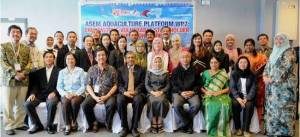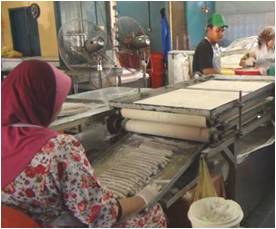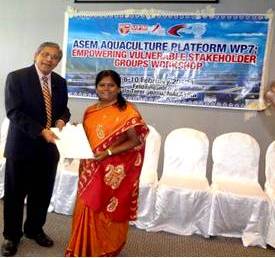Workshop short report by the following four colleagues from the Indian Council for Agricultural Research.

Group at ASEM Workshop. Photo. Dr B. Shanthi
Dr B. Shanthi, Senior Scientist, CIBA, Chennai
Dr.B.Meenakumari, Deputy Director General, (Fisheries), New Delhi
Dr.P.Jayashankar, Director, CIFA, Bhubaneswar, Orissa, and
Dr.Vipinkumar,V.P, Senior Scientist, CMFRI, Kochi, Kerala.
Under the UPM (Universiti Putra Malaysia) led ASEM Aquaculture Platform WP7 (ASEM stands for Asia-Europe Meetings: note this program is no longer active), a workshop on “Empowering Vulnerable Stakeholder Groups” was held from 6-10 February 2012 in Kuala Terengganu, Malaysia. From Indian government institutions Dr.B.Meenakumari, Deputy Director General, (Fisheries), ICAR, New Delhi, Dr.P.Jayashankar, Director, CIFA, Bhubaneswar, Orissa, Dr B. Shanthi, Senior Scientist, CIBA, Chennai and Dr.Vipinkumar,V.P, Senior Scientist, CMFRI, Kochi, Kerala, participated in this programme. There were 28 participants (14 women and 14 men) from India, Cambodia, Indonesia, Philippines and Malaysia.
The workshop was led by the WP7 (gender) Platform Programme Director, Prof. Dato Dr. Mohamed Shariff bin Mohamed Din (UPM) and Dr. Zumilah Zainaludin as Co-ordinator. In addition the major resource persons from UPM were Dr. Jariah Masud and Dr. Husna Sulaiman.

Kerepok lekor machine seen during field visit. Photo. Dr B. Shanthi.
The major topics covered were basic understanding of gender, poverty eradication policy and programme, gender issues in development, gender issues and barriers in aquaculture, gender analysis tools, livelihood analysis, development context, stakeholder analysis, empowering vulnerable stakeholders, gender mainstreaming and budgeting, gender disaggregated data, scaling up, best practices in aquaculture food production, logical framework analysis and action plan preparation and presentation.
The participants enjoyed a field visit to entrepreneurial ventures of women – two kerepok lekor (fish sausage) enterprises and a community project for culturing red tilapia – and to the Fisheries University at Kuala Terengganu.
The workshop is one of the work packages under the AqASEM09 (Asia−Europe Meeting Aquaculture Platform) –a European Commission supported project under the 7th frame work programme (FP7) Cooperation Theme: Food, Agriculture, Fisheries and Biotechnologies. Coordinated by Ghent University, Belgium, it involves nine participating European and Asian institutions/organizations.

Prof. Dato’ Md Shariff presenting workshop certificate to Dr B. Shanthi. Photo. Dr B. Shanthi.
The project intends to work out an action-oriented agenda for co-operation and to develop a multi-stakeholder platform for dialogue, networking and continued coordination concerning sustainable aquaculture between EU and Asia. Through its different stakeholders the platform aims to reconcile ecological and socio-economic demands and introduce or consolidate concepts of sustainability in aquaculture development in both regions. The platform connects experts, the public and policy-makers by disseminating knowledge up to policy levels as well as down to farmers or consumers.
The major purpose of the gender workshop was to learn about gender analysis tools, share country experience in aquaculture, and develop action plans for empowering poor fisherfolk including women and men. In addition to the training sessions, workshop participants shared best practices in poverty eradication and addressing gender issues among aquatic food production communities. Participants prepared action plans for their respective countries. The deliberations and country experiences presented during the workshop were widely distributed among the members of the workshop for integrating gender issues in aquaculture.
Each country delegation consisted of two policy makers (one woman and one man) and two extension workers (one woman and one man). An example national goal for women in fisheries is “To achieve sustainable economic empowerment of women fisher folk in country’s fisheries sector.”
This entry was posted in: Aquaculture, Gender, India, Men, Women
